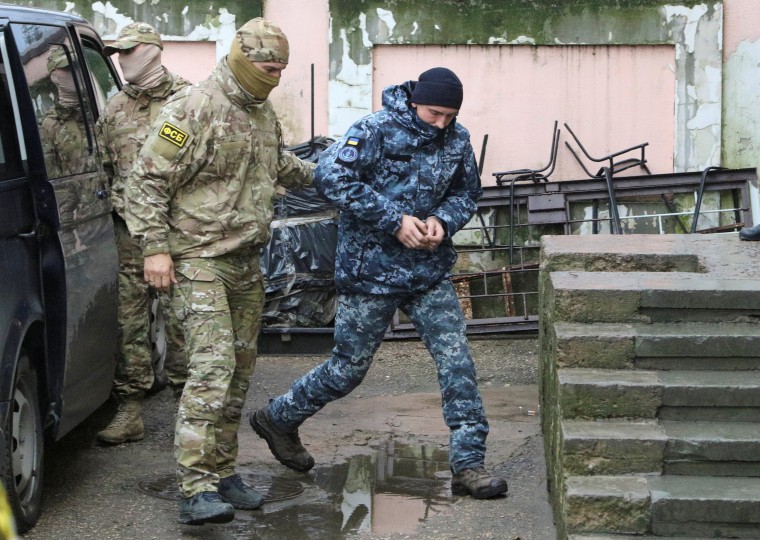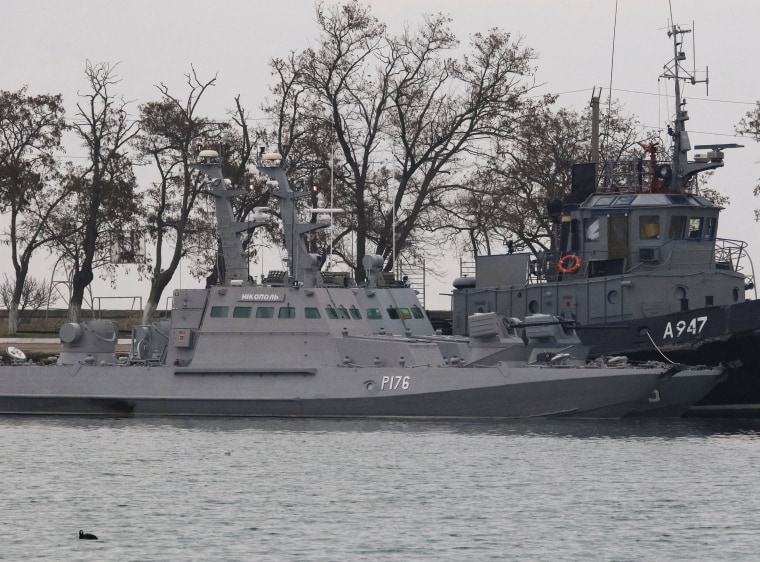When Russian ships attacked and seized three Ukrainian naval vessels in November, the incident unleashed a flurry of international condemnation, but spurred little real-world support for the would-be NATO and E.U. member.
More than a month later, 24 Ukrainian sailors are still in Russian custody, and tensions between the neighbors remain high.
Former U.S. diplomats and experts say Washington should be doing more to punish Russian President Vladimir Putin, who also annexed of Crimea in 2014 and is backing rebels in a conflict in eastern Ukraine that has claimed 10,000 lives.
President Donald Trump canceled a meeting with Putin at the G-20 summit in Argentina and the State Department announced $10 million in military financing for Ukraine to bolster its navy. An American warship is also being sent to the Black Sea as part of what the Navy described as "routine operations."
Those measures fell short of what Ukrainian President Petro Poroshenko was hoping for — American and other NATO members' ships sailing through the Kerch Strait into the Sea of Azov.
Ukraine believes Putin is trying to blockade its ports and transform the Azov into a de facto Russian lake.
John Herbst, who served as ambassador to Ukraine from 2003 to 2006 under President George W. Bush, said words would do little to stop Putin.
"The Kremlin is not going to be dissuaded by condemnation," said Herbst, who is now the director of the Eurasia Center at the Atlantic Council, a Washington-based foreign policy think tank. "They will be dissuaded by pain. Pain that comes from sanctions and the pain that may come from providing weapons to Ukraine."
Herbst said providing Kiev with anti-ship missiles and patrol ships would give Ukraine "a partial asymmetric advantage in defending itself in the Sea of Azov."
The U.S. sold $47 million worth of Javelin anti-tank missiles to Ukraine in 2018 to help build its long-term defense capacity — something Herbst says many observers feared would exacerbate tensions with Moscow.
However, that move was met with a "weak response" from the Kremlin, the former ambassador said.
"You can never rule out a major escalation, but I think the price for Putin of doing that is pretty high," Herbst added.
Keir Giles, a senior consulting fellow at Chatham House, a London think tank, said fears of Russian retaliation, not just in Ukraine but potentially against the U.S. as well, would be an important consideration in any U.S. response to the naval clash.
Michael McFaul, a U.S. ambassador to Russia under President Barack Obama who is now a NBC News and MSNBC contributor, says he was surprised by the Trump administration's muted response to what he described as “an illegal detention” of the Ukrainian sailors.

“Putin has kidnapped two dozen innocent Ukrainian sailors in international waters,” McFaul said. “That is an outrageous act that demands a public response from President Trump himself.”
Ukraine maintains the crew members should be treated as “prisoners of war” and is demanding their release. But Russian authorities say they are "trespassers" who ventured across Russia's territorial border.
“What I worry most of all is that the world has simply moved on, and forgotten about these Ukrainian sailors,” McFaul added.
National security adviser John Bolton said last month that Trump and Putin won't meet again while Russia still holds Ukrainian ships and sailors.
Balazs Jarabik, a nonresident scholar at the Carnegie Endowment for International Peace, said Ukraine's presidential election that's scheduled for March will likely play a role in any Russian response.
"As far as I see it, Russia is not interested in further escalation until the election as that may help incumbent Poroshenko," Jarabik said, adding that the Ukrainian president is also not interested in another naval clash in the Kerch Strait.
The State Department did not provide a comment when contacted by NBC News, citing the partial government shutdown.



